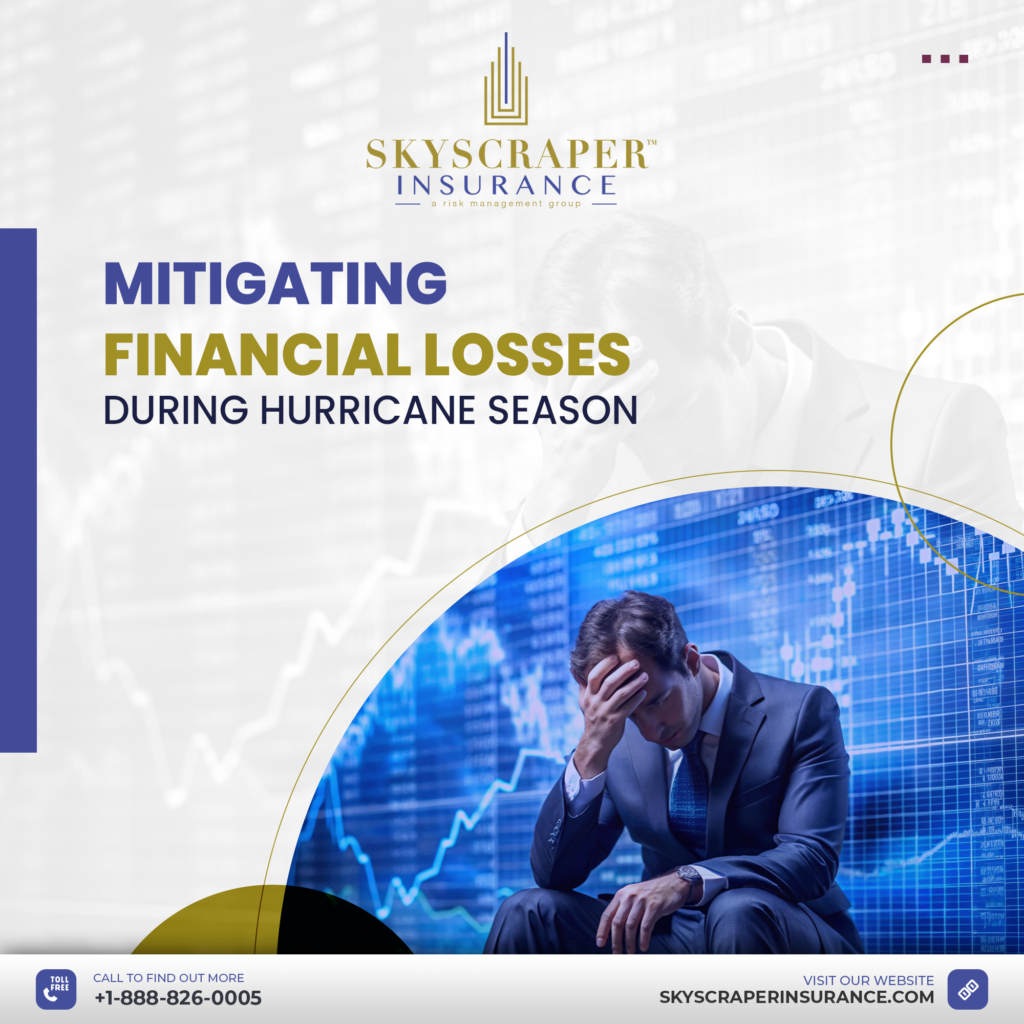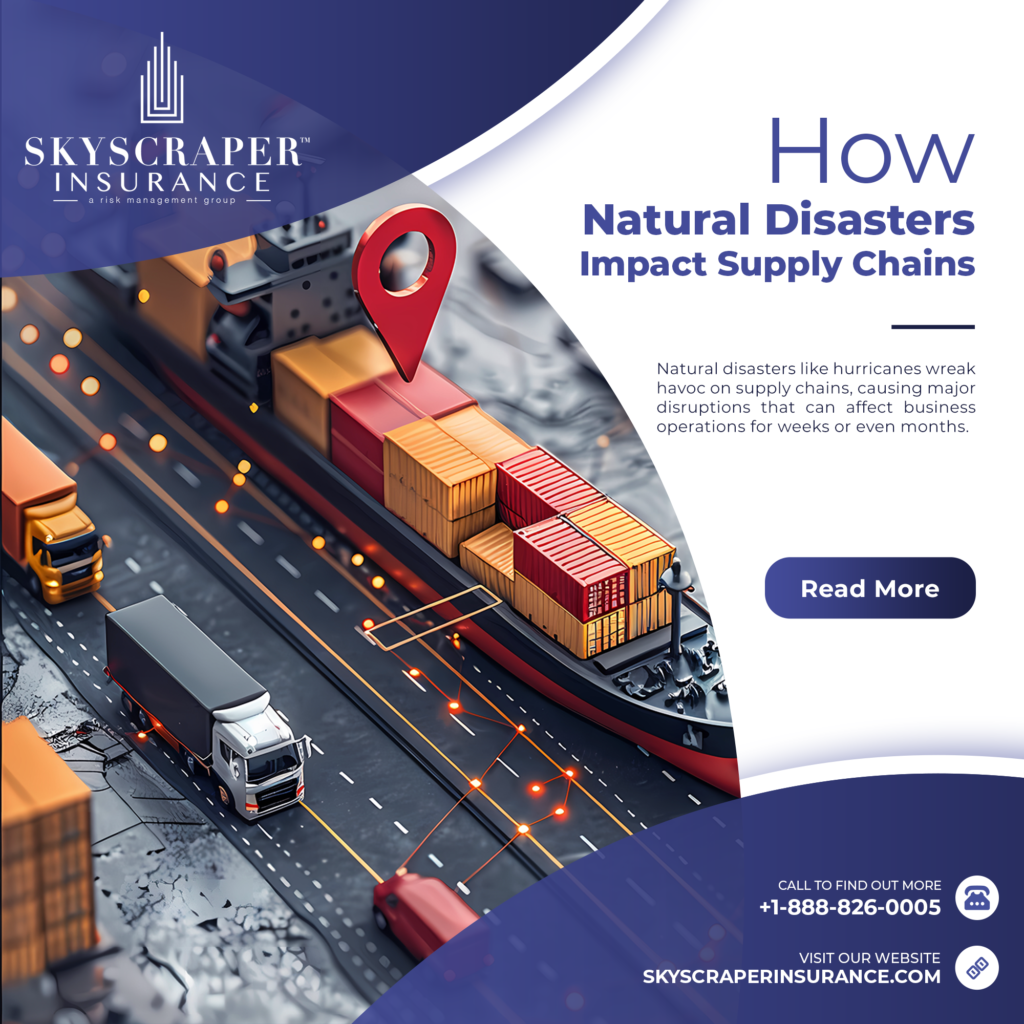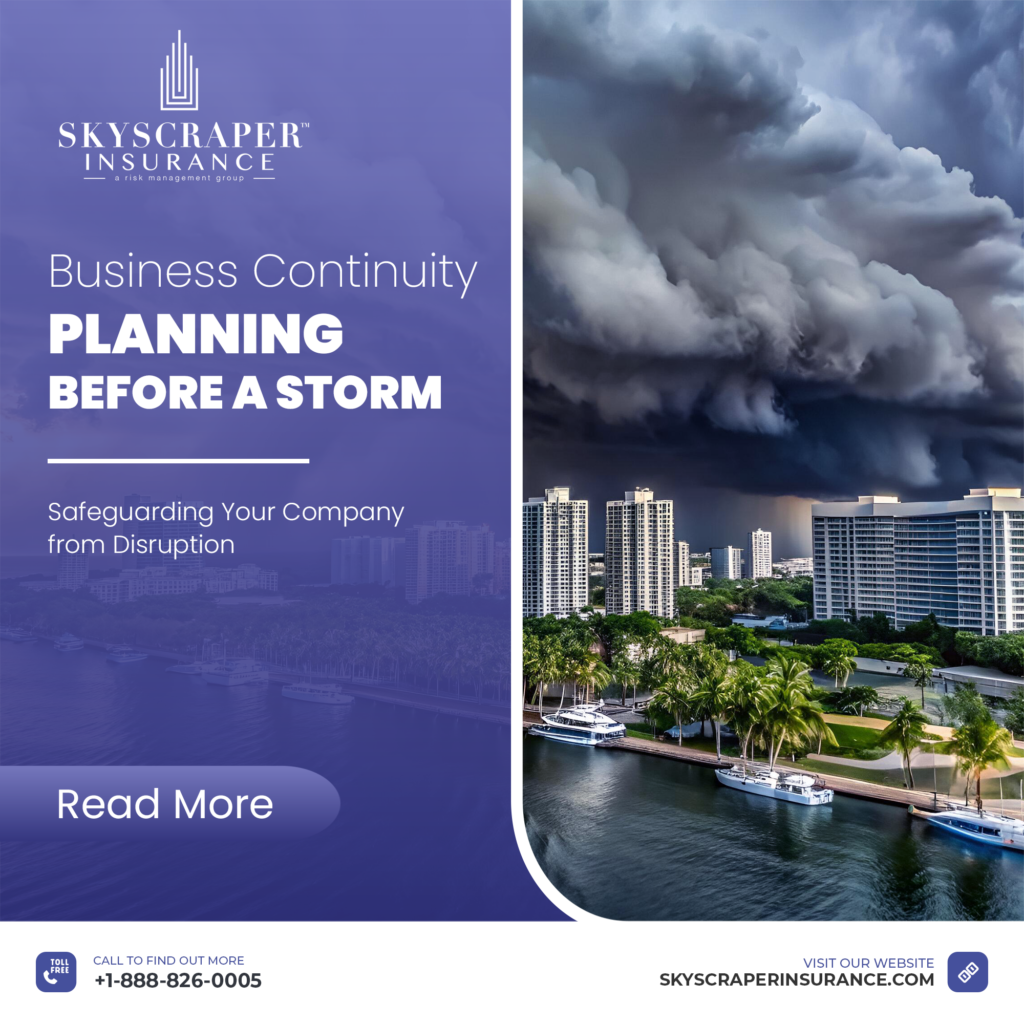Mitigating Financial Losses During Hurricane Season: A Skyscraper Insurance Guide

As hurricane season approaches, businesses must take proactive steps to safeguard against financial losses. At Skyscraper Insurance, we understand the unique challenges companies face in times of disaster, and we’re committed to helping our clients navigate them successfully. Here’s how your business can mitigate financial risks with the right strategies and support. 1. Diversifying Income Streams for Resilience A diversified revenue model is crucial to withstanding the disruptions caused by hurricanes. Skyscraper Insurance works with businesses to evaluate new opportunities—whether it’s launching an online platform, expanding services, or entering new markets. This ensures that if one revenue stream is impacted, others can sustain the business. 2. Comprehensive Insurance Coverage The first line of defense is making sure your insurance policies are up to date and cover potential hurricane-related damages. Skyscraper Insurance specializes in providing tailored insurance solutions, including business interruption coverage, property damage, and flood insurance, to protect our clients against catastrophic financial losses. 3. Creating a Contingency Plan with Experts In partnership with Skyscraper Insurance, businesses can develop disaster contingency plans that ensure operations continue smoothly, even in the face of supply chain delays or power outages. We help you establish backup solutions, such as alternate suppliers or inventory management systems, minimizing financial fallout. 4. Maintaining a Recovery Fund Skyscraper Insurance advises its clients to maintain a recovery fund, ensuring fast access to resources for repairs, inventory restocking, and other unforeseen costs. This proactive approach enables businesses to get back on their feet quickly without waiting for loans or insurance claims to process. 5. Leveraging Government Aid and Local Resources In the aftermath of a hurricane, government aid can be crucial for businesses. We assist our clients in navigating grants, low-interest loans, and tax breaks available through local and federal disaster relief programs, ensuring that financial recovery is swift. 6. Risk Management Strategies At Skyscraper Insurance, we provide businesses with customized risk management strategies designed to reduce vulnerabilities and protect financial stability. From evaluating potential hazards to implementing risk-transfer solutions, we help you mitigate loss before a disaster strikes. 7. Ensuring Proper Documentation for Claims Keeping detailed financial records is essential for filing accurate and timely insurance claims. We help clients organize and maintain critical documents that streamline the claims process, ensuring a quicker recovery period. Skyscraper Insurance: Your Partner in Resilience While hurricanes can be unpredictable, your business doesn’t have to face them alone. At Skyscraper Insurance, our commitment goes beyond coverage; we provide expert guidance and comprehensive risk management services that empower businesses to stay strong and resilient during hurricane season.
How Natural Disasters Impact Supply Chains: Lessons from Hurricanes

Natural disasters like hurricanes wreak havoc on supply chains, causing major disruptions that can affect business operations for weeks or even months. For businesses, it’s critical to understand how these disruptions occur and to take steps to mitigate them. At Skyscraper Insurance, we help our clients navigate these challenges with smart risk management strategies that protect their bottom line. Here’s how hurricanes impact supply chains and what businesses can do to prepare. The Impact of Hurricanes on Supply Chains Hurricanes affect supply chains in several key ways: Minimizing the Impact: Strategies for Business Resilience While hurricanes are unpredictable, businesses can minimize their impact on supply chains through proactive planning: Inventory and Distribution Strategies Hurricanes often lead to localized supply shortages in the regions directly affected, but businesses that rely on global supply chains must also be wary of broader impacts. Global markets can feel the ripple effects as businesses look for alternative suppliers or routes, which might drive up costs and delay deliveries. Supporting Employees and Customers Beyond the logistical impact, hurricanes also bring safety risks to employees and customers. Ensure that safety plans are in place, including clear evacuation procedures and communication strategies. For employees working in distribution or warehouses, it’s essential to prioritize their well-being by closing operations in unsafe conditions and providing post-storm recovery support. Final Thoughts Supply chains are the backbone of many businesses, but they are also vulnerable to the unpredictable forces of nature. By diversifying suppliers, investing in technology, and planning ahead, businesses can minimize the disruption caused by hurricanes and other natural disasters. At Skyscraper Insurance, we’re here to help our clients protect their supply chains and navigate the challenges posed by these extreme events.
Business Continuity Planning Before a Storm: Safeguarding Your Company from Disruption

As Florida faces the looming threat of hurricanes each season, it’s critical for businesses to take proactive steps in safeguarding operations, employees, and assets. Effective business continuity planning (BCP) can make all the difference between surviving a storm with minimal disruption and facing long-term operational setbacks. 🌩️ Here are key strategies to help your business prepare for the inevitable: 1. Assess and Understand Your Risks Start by identifying the risks specific to your business. Is your office located in a flood-prone area? Do you rely on coastal shipping routes? How would a power outage affect your services? Understanding your vulnerability helps prioritize which areas need immediate attention. 2. Develop a Communication Plan In the event of a hurricane, seamless communication is vital. Establish an internal emergency contact list, including alternate ways to connect in case of network failures. Create a communication chain to ensure every employee is aware of the steps to follow before, during, and after the storm. 📞 It’s also essential to inform customers and clients about any potential service disruptions and establish a plan to maintain customer support, whether through remote means or emergency hotlines. 📱 3. Back Up Your Data and Critical Systems Hurricanes can lead to extended power outages or physical damage to IT infrastructure. Regularly back up all data to secure off-site or cloud-based storage. Ensure that essential business applications and systems can be restored quickly in case of damage to physical hardware. 💾☁️ 4. Secure Your Property and Physical Assets Safeguard your business premises by investing in physical protections such as storm shutters, sandbags, and waterproofing. Don’t forget to move valuable equipment to safe locations and inspect emergency generators for readiness in case of extended power outages. Insurance coverage is also a key component of protecting physical assets. Make sure your insurance policies are up to date, and assess whether you have sufficient coverage for property damage, business interruption, and liability claims related to storm damage. 🏢💡 5. Plan for Remote Work and Operational Continuity If employees are unable to come into the office due to unsafe travel conditions or damage, it’s important to have the infrastructure in place for remote work. Ensure that your employees have access to necessary tools, software, and information to work effectively from home. 🏠💻 Additionally, outline contingency plans for essential functions—such as customer service, finance, and operations—so they can continue without interruption. 6. Run Drills and Test Your Plan A business continuity plan is only as good as its execution. Regularly conduct drills and simulations to test your emergency plans. This will help identify gaps and allow you to make adjustments before a real storm hits. 💪 By following these steps, businesses can be better equipped to weather the storm and emerge stronger on the other side. Business continuity planning is more than just insurance coverage; it’s about building resilience into your everyday operations to ensure long-term success. At Skyscraper Insurance, we’re here to help you build and refine your risk management strategies, ensuring that you and your business are protected before, during, and after the storm. 🌟 Stay tuned for more safety and recovery tips as we guide you through the entire storm season process. Stay safe, stay prepared!
